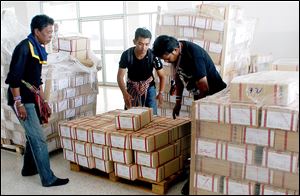
Thai voting disrupted; crisis likely unresolved
Protesters block polls, disenfranchise millions
2/2/2014
Anti-government protesters check ballots they’ve have seized since last month to disrupt elections before handing the papers back to officials in Hat Yai district, southern Thailand. Officials said poll closures affected 18 percent of voters.
BANGKOK — Thailand held national elections without bloodshed Sunday amid fears of violence, but the crisis is far from over.
One of the next flashpoints is likely to be an effort to nullify the vote.
Balloting was largely peaceful, but protesters forced thousands of polling booths to close, disenfranchising millions of voters.
The result: Not all Parliament seats will be filled and the nation could stay mired in political limbo for months, the winning party unable to form a government.
The struggle to hold the vote was part of a three-month conflict that has split the country between Prime Minister Yingluck Shinawatra’s supporters and those who claim her government is too corrupt to rule.
The crisis, in which demonstrators have occupied major intersections in Bangkok and forced government ministries to shut down and work elsewhere, overshadowed the poll’s runup to the point that campaigning and speeches were virtually nonexistent.
Rather than “a contest among candidates, it was about whether the election itself could happen,” said Sunai Phasuk of Human Rights Watch. “That in itself says a lot about the fate of democracy in Thailand — it’s hanging by a thread.”
TV stations, which normally broadcast results, were reduced to projecting graphics not of party victories and losses, but of which polls were open or closed.
Official results cannot be announced until by-elections are held and all districts vote. The first will take place Feb. 23.
In Bangkok, protesters surrounded government offices where ballot papers were stored, barring them from delivery. They pressured election officials not to report for duty, and in some cases physically kept people from voting.
Livid voters cut chains off locked polling stations, demanding futilely to be allowed to vote.
In one district, people hurled bottles at each other and one demonstrator fired a gunshot after several people tried to push past a blockade. After authorities called off voting there, angry crowds stormed into the district office.
“We want an election. We are Thais,” Bangkok resident Narong Meephol, 63, said, waving his voter identification card. “We are here to exercise our rights.”
Ampai Pittajit, 65, a retiree who helped block ballot boxes, said she did it “because I want reforms before an election.”
The Election Commission said poll closures affected about 18 percent of the country’s 48 million registered voters, although many may not have cast ballots anyway after a boycott by the opposition Democrat party, which is calling for political and economic reform first.
The protesters want to suspend democracy and are demanding the government be replaced by an unelected council that would rewrite political and electoral laws to combat deep-seated problems of corruption and money politics.
Ms. Yingluck has refused to step down, arguing she is open to reform and such a council would be unconstitutional.
Ms. Yingluck called for Sunday’s vote after dissolving Parliament in December in a failed bid to defuse the crisis. She now serves as a caretaker premier with limited power.